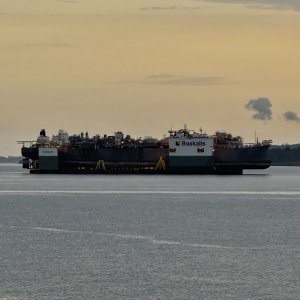
The Backstory
Our client, a significant player in the oil and gas sector, faced a challenge with one of their FPU’s. Originally an oil tanker from the 1970s, transformed into a production platform in the 1990s, this massive FPU was nearing its retirement. Due to an unforeseen event, an accelerated recycling solution was required—an urgent task the client entrusted us with.
Initial Assessment and Planning
The initial assessment included the exploration of regional and global recycling possibilities. The client’s high sustainability standards, timeline, and need for a cost-efficient solution called for an international approach.
Our next move was to perform a detailed Inventory of Hazardous Materials (IHM) on board the ship. Despite the complexities of visa requirements and travel hurdles, we managed to have our specialist on site just days after the initial request. This record response was driven by our flexibility, creativity, and speed of action, eliciting great appreciation from the client.
Once there, we also assisted the client with a required survey for (low-level) radioactive material (NORM) and mercury. Throughout this process, we provided assistance and advice: we facilitated the survey preparation, approached suitable partners, and critically reviewed the chosen partner’s plan of action.
Choosing the Right Way Forward
The urgency of the situation, coupled with the results of the inventory, meant that finding the right recycling facility was both critical and challenging. We supported our client in narrowing down the selection of possible partners and carefully reviewed the competencies of potential yards: what standards do they use? Do they really comply with international ship recycling regulations as they claim? In addition, we had to consider the feasibility of transporting the ship to the yard and what that would require.
After this careful research, we requested bids from several suitable shipyards. This resulted in a contract with a European recycling facility that met the necessary standards and was equipped to handle the FPU’s scale. We guided the client through the contract phase with the yard and ensured that sustainability clauses were included, resulting in a beneficial contract for our client.
Navigating Compliance
To allow the vessel to be shipped to the yard in Europe, our next challenge was to navigate the intricate web of export formalities. We were facing a pressing deadline due to the ship’s decommissioning timeline and the limited availability of cargo ships large enough to transport the FPU.
Despite these challenging circumstances, we successfully guided the client through the required procedures, securing an export license under the Basel Convention. As a result, the FPU could be shipped to its final destination as planned.
Ongoing Engagement
Since the FPU’s arrival at the European yard, we’ve remained actively involved in this project. A Sea2Cradle site rep is consistently present at the facility, providing oversight, advising the yard on best practices, and ensuring that the dismantling process is in line with safety and environmental protocols. Through regular updates and transparent communication, we ensure the client remains fully informed.
Get In Touch
Through our efforts, we were able to arrange the sustainable decommissioning of the client’s FPU faster than usual; crucial for this time-sensitive project. In addition, we provided considerable support by guiding our client through every step and taking a substantial weight off their shoulders.
Are you facing the complexities of decommissioning? And are you seeking a partner to assist you in this task, prioritizing a sustainable approach and comprehensive unburdening? Please reach out to us. We’d be happy to discuss how Sea2Cradle can offer you a custom solution.